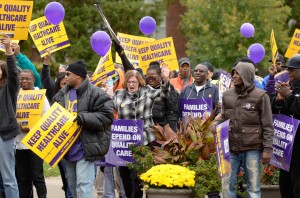
Sam Bearzi, Contributing Photographer
The Service Employees International Union (SEIU) and UR have been negotiating new contracts for service workers at the River Campus and the UR Medical Center (URMC), but have yet to reach an agreement. This resulted in protests and picket lines at URMC on Friday, Oct. 12 and on the River Campus on Saturday, Oct 13.
Workers covered by the union include patient care technicians, nursing unit secretaries, surgical assistants, environmental service staff, food service staff, transportation staff and materials processing staff. Although several non-economic issues such as hiring rules and funding for an education program for workers have been decided, the most contentious issues regarding changes in health care, child care and wages have yet to be resolved.
The union workers’ current contract, which covers 1,800 workers, expired on Sept. 22 and has been extended three times as negotiations have continued. These discussions on Sept. 28 and Oct. 8 broke off without any resolutions. Negotiations, which are taking place with a federal mediator, resumed again on Monday, Oct. 15, continuing into Tuesday, Oct. 16. The contract has been extended until Saturday, Oct. 20.
According to Teri D’Agostino, spokesperson for the University on the matter, the union has asked “for an increased contribution to their existing health care plan with the National Benefits Fund.” In a counter offer to the union request, UR requested that workers move to the University health insurance plan that offers “a package comparable to that offered to non-union employees,” according to D’Agostino.
In a statement to the media, UR said that the University is “committed to offering a compensation package for unionized employees that’s highly competitive, as well as fair and equitable with our non-union staff … recommending would make it easier for both the University and the union to understand the health needs of employees and better control costs for health care coverage. Moving to University health insurance would also provide unionized employees with more choices of plans and access to preventive care at a variety of prices — the same choices enjoyed by our non-union employees.”
According to a union-produced fact sheet, however, the UR health care plan “would cost the workers over $2,500 more … for a family plan with less coverage than their current benefit.”
Bruce Popper, union vice president for the region, contends that the University’s “best [health care] plan is still not as good as the one [the union] provides and costs more and has less coverage. It essentially amounts to a pay cut.”
An online calculator accessible to employees, according to D’Agostino, can assist workers in deciding which plan is best for them. Without using the calculator, D’Agostino said that “union members … wouldn’t be able to know how their true costs will change.” D’Agostino further stated that “there can be hidden costs in plans. You might not pay premiums [under the current plan], but you have to look at the plan holistically — how much you pay for doctor’s visits, how much you pay if you’re hospitalized, things like that.”
Other controversial issues include UR’s offer of a one percent wage increase and a supplemental cost for child care options, a necessity for working mothers, union members say.
According to the union fact sheet, the average wage of a full-time service worker is $27,900. The poverty line for a family of four is $23,050.
Dawn Marshall-Hosier, an employee at Danforth Dining Center, has worked at UR for 18 years.
“We can’t afford anything less than we have,” Marshall-Hosier said of the negotiations. “The model of the University is
“Meliora,” so these workers come to work to perform these services to the best of their ability. It’s really important that we’re here to meet the needs that students have, but at the same time, we need to be taken care of.”
Remus is a member of the class of 2016.




